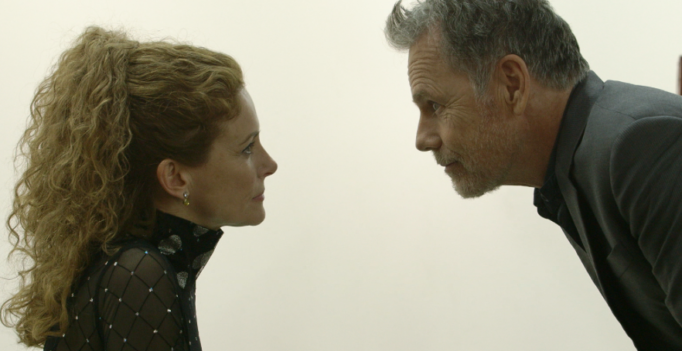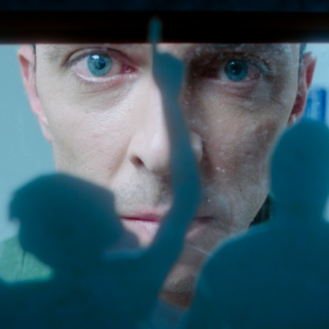By: Trevor Chartrand
An adaptation of the stage play Pornography (written by Jeff Kober), Lie Exposed explores a series of relationships on the edge of ending, following each couple’s attendance at a controversial art installation. The art in question features tintype photographs of vaginas, which for most of the couples sparks a conversation about their own sex lives as well as the objectification of the female form. Thematically, the film explores the definition of art vs the nature of pornography.
It’s important to see this film with the understanding that it’s built on the foundation of a play – a character driven, dialogue-heavy piece that features inner monologues throughout. This film is likely a faithful adaptation of the play, however it’s not very cinematic as a movie. During the adaptation process, the filmmakers ultimately fail to breathe new life to the story under a new medium.
The film tells the story of Melanie (Leslie Hope), an aspiring artist and former alcoholic who has an affair with the tintype photographer (Jeff Kober) helping her develop her art piece. When the affair is discovered by her husband, played by Bruce Greenwood, the two of them consider the impact it will have on their own relationship going forward. Following the unveiling of her gallery, a series of other couples in attendance have some similar conversations about what the art installation means to them.
The protagonist of the film, Melanie, is a hard woman to relate to. She seems like an out of touch, vapid, even whiny, artist staring down the barrel of a mid-life crisis. A former alcoholic, she spends a good portion of her inner monologues complaining about how badly she wants to drink. With all due respect to a very real condition, her constant complaining, no matter how poetic it may be, tends to grind on the nerves. The film asks for sympathy towards this character after she commits adultery and rants tirelessly, ‘woe is me.’
Outside of Melanie’s story, this film essentially boils down to a series of couples arguing, one after another, without a whole lot of context as to who the couples are or why we, as an audience, should be concerned about their arguments. Each couple gets their own scene, almost like a short film within the film, to hash things out with their significant other. Some of these scenes are more interesting than others, but overall the conversations are thematic in nature, offering different perspectives and answers to the question the film is exploring. Rather than consider these ideas visually or with a more subtle approach, each character simply states their opinions in dialogue that is very on-the-nose. Again, this most likely works effectively on the stage, but when adapting for film, a different approach needs to be taken.
Technically, this film is competent at best, without much to offer as far as visual style goes. It’s important to draw attention to the quality of the sound recording/mixing however, which is adequate for the most part – with one exception. During a scene in which Bruce Greenwood’s character speaks to Melanie over the phone, her dialogue on speakerphone is muffled and illegible. I n a film driven by the spoken word, unintelligible dialogue is inexcusable, especially since a simple post-production recording session could have easily solved the problem.
And so, while Lie Exposed does feature some decent performances overall, it ultimately doesn’t work as a cohesive film – at least not in this reviewers opinion. The narrative is disjointed and jarring, with characters coming and going without being properly established or defined. The film is a thematic, almost philosophical, discussion rather than setting out tell a conventional story. That’s not to say this won’t work for some folks, but in my mind, this material should have stayed on the stage.
**********
Do You Tweet? Follow These Tweeple:
Trevor Chartrand: @OhHaiTrebor





Be the first to comment